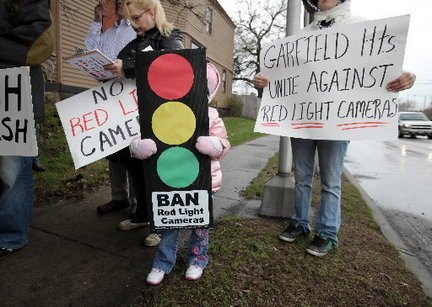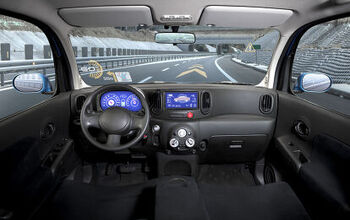Garfield Heights Mayor Wants City To Become Red Light District, Again

Last November, citizens of Garfield Heights, OH, banned the use of red light cameras in the city. The vote was close, 4,827 to throw the cameras out against 4,735 for keeping them. But presidencies were decided on a slimmer margin. The keeps the cams side had powerful support: A PAC called “Safe Road Ohio” lobbied for the cameras, with the requisite pictures of little children.
According to the Plain Dealer, the primary donor of this PAC is “Redflex Traffic Systems — the company that operates the city’s camera program and pockets $35 from every speeding ticket issued.” The Garfield Heights Council doesn’t seem to hold democracy in high esteem. Last week, the Council moved to bring the cameras back into the city.
According to The Neighborhood News, the city will ask voters to approve an amendment that would allow cameras within 300 feet radius of school zones and city-owned parks and rec areas. This is the oldest trick in the book. I bet if you draw boundaries 300 feet from school zones, parks and rec areas, most places where cameras will bring in the desired revenue will fall within those lines. The city does not even hide that it is after money. “Safety and fiscal constraints” were cited as reasons to ask citizens to let the cameras back in.
One of the highest profile perpetrator of the school zone ploy was New York City’s then Mayor Giuliani, who drove strip clubs and porn shops out of most of the city by making the illegal “within 500 feet of churches, schools, day care centers and each other.” According to the Daily News, this “effectively banishes such businesses to the city’s industrial edges.” What’s good against red lights seems to work just as well for red lights.
Garfield Heights Mayor Vic Collova is listed as a co-chair of the pro-camera PAC. He had been warned not to “intermingle funds between his election campaign funds and the camera efforts.”

Bertel Schmitt comes back to journalism after taking a 35 year break in advertising and marketing. He ran and owned advertising agencies in Duesseldorf, Germany, and New York City. Volkswagen A.G. was Bertel's most important corporate account. Schmitt's advertising and marketing career touched many corners of the industry with a special focus on automotive products and services. Since 2004, he lives in Japan and China with his wife <a href="http://www.tomokoandbertel.com"> Tomoko </a>. Bertel Schmitt is a founding board member of the <a href="http://www.offshoresuperseries.com"> Offshore Super Series </a>, an American offshore powerboat racing organization. He is co-owner of the racing team Typhoon.
More by Bertel Schmitt
Latest Car Reviews
Read moreLatest Product Reviews
Read moreRecent Comments
- Joe65688619 My last new car was a 2020 Acura RDX. Left it parked in the Florida sun for a few hours with the windows up the first day I had it, and was literally coughing and hacking on the offgassing. No doubt there is a problem here, but are there regs for the makeup of the interiors? The article notes that that "shockingly"...it's only shocking to me if they are not supposed to be there to begin with.
- MaintenanceCosts "GLX" with the 2.slow? I'm confused. I thought that during the Mk3 and Mk4 era "GLX" meant the car had a VR6.
- Dr.Nick What about Infiniti? Some of those cars might be interesting, whereas not much at Nissan interest me other than the Z which is probably big bucks.
- Dave Holzman My '08 Civic (stick, 159k on the clock) is my favorite car that I've ever owned. If I had to choose between the current Civic and Corolla, I'd test drive 'em (with stick), and see how they felt. But I'd be approaching this choice partial to the Civic. I would not want any sort of automatic transmission, or the turbo engine.
- Merc190 I would say Civic Si all the way if it still revved to 8300 rpm with no turbo. But nowadays I would pick the Corolla because I think they have a more clear idea on their respective models identity and mission. I also believe Toyota has a higher standard for quality.



































Comments
Join the conversation
The corruption in NE Ohio politics is legendary, and this just continues that theme. Hopefully voters will become so incensed that they'll push back.
Hopefully, they keep the cameras and the protesters learn how to not run red lights. Yes, it's a tax, but not one without representation. (They can elect people who won't renew the contract.) What's awesome about these taxes is that they are voluntary. Don't want to pay the lottery tax? Don't buy tickets. Don't want to pay the red light camera tax? Don't run red lights. Effectively, this is a tax on stupid, and I'm in favor of stupid people being taxed instead of me.